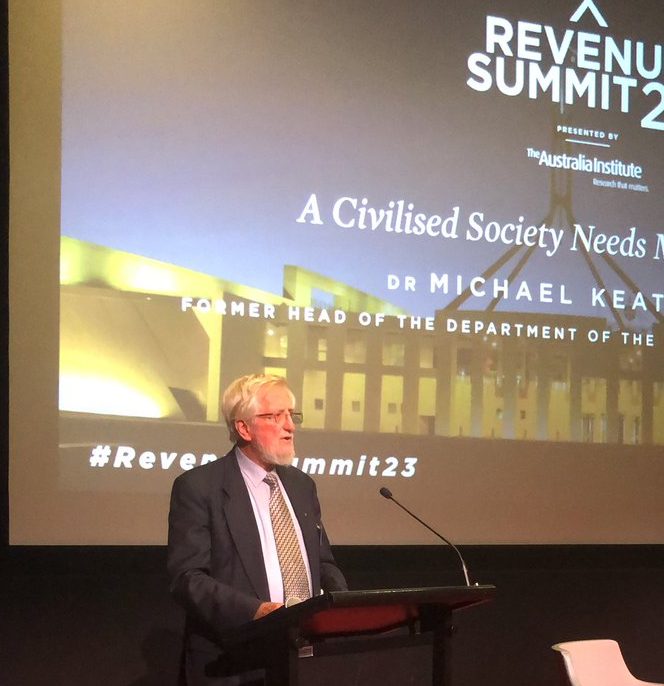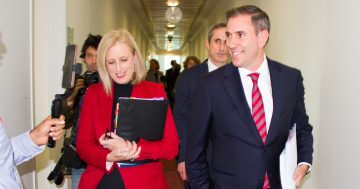
Former top public servant Dr Mike Keating says we need higher taxes. Photo: Australia Institute.
Former secretary of the Department of Finance Mike Keating has delivered a bold speech calling for increases to taxes to keep up with the standard of service delivery the public expects.
He warned that budget pressures from the care economy – health, education and housing – will continue to rise significantly over coming decades, so the tax base must be increased to keep pace.
Addressing the Australia Institute’s Revenue Summit 2023 at Parliament House on Friday (27 October), the retired public servant – who was also secretary of the Department of Prime Minister and Cabinet – said Australia needed a full-scale revenue review.
“There is no correlation between present overall levels of taxation and any country’s economic growth rate,” Dr Keating said.
“Many high-taxing countries in northern Europe, for example, have a higher growth rate in their per capita GDP than low-taxing countries such as America.
“Similarly, the drop in Australian income tax rates in the 1980s was not associated with any increase in employment participation or productivity growth, and Australia is already one of the lowest taxing countries among the developed nations of the OECD.”
The tax measures Dr Keating suggested include a carbon tax, congestion charging and substituting a land tax for stamp duty.
He said the GST should be lifted, and a resource rent tax should be introduced so the community can share some of the super profits that mining companies make due to “fortuitous circumstances, rather than their effort or initiative”.
Dr Keating called for a crackdown on company tax avoidance, but also the closing of loopholes in the personal income tax system like the rate of capital gains taxation and negative gearing.
A more progressive income tax rate scale, with the starting point at least adjusting the stage three tax cuts was needed, he said, adding that a full-scale review of the rate scales would be an even better move.
“There is ample evidence that government services and assistance in Australia are presently underfunded, and service provision is therefore inadequate,” he said
“The only way to fix this is to increase the amount of taxation revenue. But this will require an important change in government policies, which are founded on almost no significant change to taxes.
“And while the government seems to be sympathetic to many of the demands for improved services, it is most unlikely to change its tax policies without popular support, so we need to change the public debate.
“The public needs to accept that you cannot have adequate service provision without paying more taxes.”
Dr Keating suggested that tax as a proportion of GDP should increase by 4 per cent, and that such a move would not harm economic growth.
He said the budget fails to recognise just how much additional funding will be needed over the long term for aged care, child care, social housing, hospitals and primary healthcare, tertiary education, income support, reducing carbon emissions, and defence and foreign aid.
Prime Minister Anthony Albanese has rejected calls to change the $243 billion stage three tax cuts due to kick in mid-next year.
He and Treasurer Jim Chalmers have so far been timid in their approaches towards changing Australia’s taxation system.
Dr Keating retired from the Australian Public Service in 1996. Between 1997 and 2007, he was a visiting fellow in the economics program at the Australian National University.
In 2015, he was appointed chairman of the Committee for Sustainable Retirement Incomes, a position he still holds.
The Australia Institute, a progressive think tank, stages the revenue summit to publicly explore revenue-raising options to meet Australia’s growing public spending needs.





















